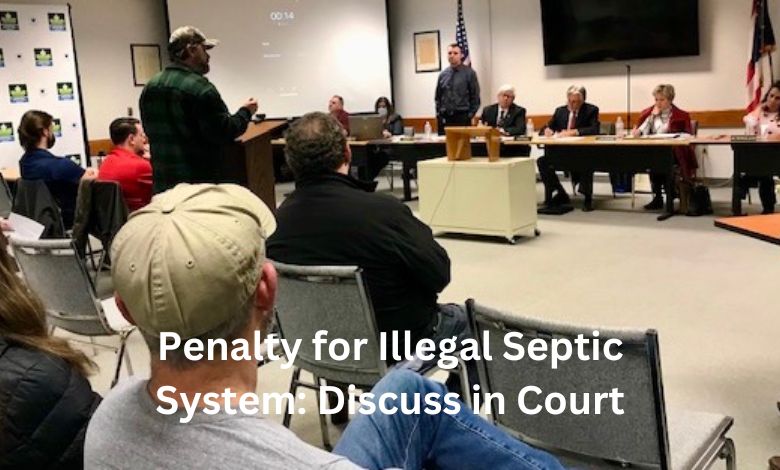Penalty for Illegal septic systems can have serious consequences, including penalties that vary depending on the severity of the violation. These penalties typically range from fines to mandated system repairs or replacements. The exact penalty for an illegal septic system is often determined by local regulations and enforcement agencies.
In addition to financial repercussions, there may be legal implications such as court appearances or orders to bring the system into compliance with existing laws. Environmental impact is another crucial aspect linked to illegal septic systems, with potential contamination of groundwater and surface water sources posing significant risks.
Understanding and abiding by septic system regulations are essential in avoiding penalties associated with non-compliance. It’s important for property owners to ensure their systems meet all necessary requirements and undergo regular inspections as needed. Being proactive in maintaining a lawful septic system can help prevent facing penalties in the future.
Hints of Content
The Environmental Impact of Illegal Septic Systems
Illegal septic systems pose a serious threat to the environment. When these systems are not properly installed or maintained, they can leak harmful contaminants into the soil and groundwater. This pollution can affect nearby water sources, leading to contamination that impacts aquatic life and ecosystems.
The release of pathogens, nutrients, and chemicals from illegal septic systems can degrade water quality and harm human health if consumed. Additionally, excess nutrients like nitrogen and phosphorus entering water bodies from faulty septic systems can contribute to algal blooms, which deplete oxygen levels in the water and create dead zones where marine life cannot survive.
It’s crucial to address illegal septic systems promptly to prevent further environmental degradation. Proper maintenance and regular inspections of septic systems are essential for safeguarding our natural resources and protecting public health.
Understanding the Legal Consequences
Illegal septic systems pose serious legal consequences for property owners. When a septic system doesn’t comply with regulations, it can lead to fines, penalties, and even legal action. These consequences are in place to protect public health and the environment from contamination risks.
Property owners must ensure that their septic system meets all local laws and regulations. Failure to do so can result in hefty fines imposed by regulatory authorities. In severe cases, property owners may be required to remove or replace the illegal septic system at their own expense.
Legal repercussions for illegal septic systems vary depending on the severity of the violation and jurisdictional laws. Some violations may be resolved through corrective actions, while others could escalate to court proceedings.
Understanding the legal ramifications of having an illegal septic system is crucial for property owners to avoid costly penalties and potential litigation. It’s essential to seek professional guidance if you’re unsure about your septic system’s compliance with regulations.
Recent Court Cases and Rulings on Illegal Septic Systems
In recent years, court cases involving illegal septic systems have been on the rise. These cases shine a spotlight on the serious environmental and health risks associated with improper sewage disposal. Judges are increasingly taking a firm stance against violators to protect public health and safeguard the environment.
Courts have been handing out hefty fines and penalties to individuals or businesses found guilty of operating illegal septic systems. Additionally, some offenders may even face jail time in extreme cases where significant harm has been caused due to their actions.
Legal experts emphasise the importance of complying with septic system regulations to avoid costly legal battles and detrimental consequences. It’s crucial for property owners to ensure that their septic systems are installed correctly, regularly maintained, and in compliance with local laws to prevent any legal troubles down the line.
Staying informed about recent court rulings can provide valuable insights into how authorities are cracking down on illegal septic system practices. By learning from these cases, individuals can better understand the severity of violating septic system regulations and take proactive steps towards ensuring compliance within their own properties.
Penalties for Violating Septic System Regulations
Violating septic system regulations can result in significant penalties. These penalties are put in place to ensure that proper wastewater treatment and disposal practices are followed, protecting both public health and the environment.
Penalties for violating septic system regulations can vary depending on the severity of the violation. They may include fines, required repairs or upgrades to bring the system into compliance, or even legal action.
In some cases, violators may be subject to daily fines until the issue is resolved. Repeat offenders may face more severe consequences, such as increased fines or even criminal charges.
It’s crucial for property owners to understand and adhere to septic system regulations to avoid these penalties. Regular maintenance and inspections can help prevent violations and ensure that your system is functioning properly.
By staying informed about local regulations and taking proactive steps to maintain your septic system, you can protect yourself from facing costly penalties in the future.
Steps to Take if You Are Facing Charges for an Illegal Septic System
If you find yourself facing charges for an illegal septic system, it’s essential to take immediate action. The first step is to consult with a knowledgeable attorney specialising in environmental law. They can provide guidance on how to navigate the legal process and protect your rights.
Next, gather all relevant documentation related to your septic system, including permits, inspection reports, and any communication with regulatory agencies. This information will be crucial in building your defence and demonstrating compliance efforts.
It’s also important to cooperate fully with authorities and follow any directives they provide regarding remediation or corrective actions. Showing a willingness to rectify the situation can work in your favour during legal proceedings.
Additionally, consider reaching out to environmental consultants or septic system professionals for expert opinions on the status of your system and potential solutions moving forward. Their expertise can be valuable in presenting a strong case in court.
Remember that facing charges for an illegal septic system can be daunting but taking proactive steps and seeking appropriate support can help navigate this challenging situation effectively.
Conclusion
The penalties for having an illegal septic system can be severe and far-reaching. Not only do these systems pose a threat to public health and the environment, but they also come with legal consequences that can result in hefty fines or even criminal charges. It’s crucial to adhere to regulations governing septic systems and take prompt action if you find yourself facing allegations of non-compliance.



